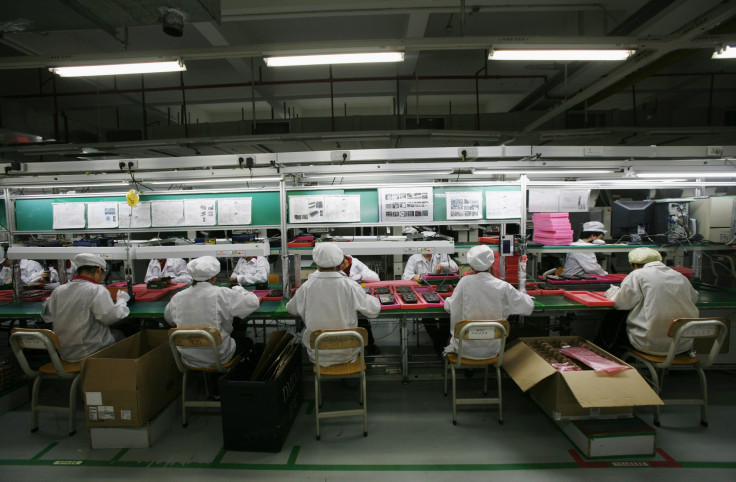In California, Companies Struggle To Combat Human Trafficking, Slavery In Compliance With Transparency in Supply Chains Act: Report

A report released Monday is shining a spotlight on how big corporate earners in California are complying with the first U.S. disclosure law addressing human trafficking and slavery within the global marketplace. The study assessed the degree of corporate disclosure compliance with the California Transparency in Supply Chains Act of 2010 and found that some affected companies are struggling to obey the compliance regulations, let alone combat labor abuses.
"Our study shows that many companies are going at this law with an attack-is-the-best-defense mentality, and their disclosures clearly demonstrate not only compliance command but also good faith effort. Others, judging from their compliance score, still have some work to do in order to live up to the letter of the law," said Chris Bayer, principal investigator at Development International, a Germany nonprofit, who co-authored the report.
The California Transparency in Supply Chains Act of 2010 was signed into law Oct. 18, 2010, by former Gov. Arnold Schwarzenegger and enacted Jan. 1, 2012. The law, the first of its kind in the nation, requires every retail seller and manufacturer doing business in California that exceeds $100 million in yearly worldwide gross receipts to disclose an annual statement detailing efforts to eliminate slavery and human trafficking from their direct supply. By forcing retailers and manufacturers to file these disclosures, the act aims to encourage companies to responsibly manage their supply chains and thus improve the lives of victims of human trafficking and slavery.
The risk of human trafficking and slavery is prominent in supply chains, many of which start on a farm and cross into various countries. Supply chains, in which a raw material such as cotton from India goes into an end-product like bedsheets at an American hotel, are often complex and have many tiers, making it difficult to track, trace and monitor production. The California act requires, at minimum, disclosure of what actions the company is taking – if any – to stop labor abuses. The required disclosures are to be posted on the company’s website with a “conspicuous and easily understood link” to the required information.
“Traffickers can target vulnerable workers anywhere to fill labor shortages everywhere along a supply chain,” the U.S. State Department said in its 2015 Trafficking in Persons Report. “The sheets in a hotel may be made with cotton harvested by forced labor."

The state of California cannot legally disclose which companies are covered by the act. But researchers from Development International identified 2,126 potentially qualifying companies, of which 1,325 – or 62 percent – had a pertinent statement. Because some companies’ subsidiaries or brands each had a statement, the researchers evaluated a total of 1,504 individual disclosures to determine their corporate compliance score. They also determined an "affirmative conduct" score for each qualifying company by assessing the relevant efforts made to confront human trafficking and slavery-like practices. It's the first comprehensive report and compliance evaluation on the California Transparency in Supply Chains Act, according to co-author Bayer. The companies the study looked at earned an estimated combined $17 trillion per year.
Overall, the study revealed that "disclosure compliance" with the California law varies greatly among companies, with an average score of 60 percent, while the average affirmative conduct score of companies with pertinent statements was just 31 percent. The report indicated there are slightly more perfectly compliant companies than perfectly non-compliant companies; but only six companies scored 100 percent on both compliance and affirmative conduct: ASO LLC, Guitar Center Inc., Bath & Body Works Direct Inc., Quidel Corporation, Recreational Equipment Inc. and Sun-Maid Growers of California.
Meanwhile, American supermarket chain Whole Foods Market scored 100 percent on disclosure compliance and 70 percent on affirmative conduct. General Motors, the world’s third-largest automaker that was entangled in a recall scandal last year, earned a compliance score of 92 percent and an affirmative conduct score of 70 percent. Apple Inc., the most profitable company in the world, scored 83 percent on disclosure compliance and 60 percent on affirmative conduct. Hipster retailer Urban Outfitters scored 25 percent on compliance and 30 percent on affirmative conduct. Tech giant Microsoft was toward the bottom of the list, scoring 8 percent on disclosure compliance and 10 percent on affirmative conduct. None of these five companies stated that it was currently developing a certain standard, system or function to combat human trafficking and slavery.
“Many affected companies still have a lot of work to do before living up to the letter of the law,” the report concluded.

Some of these companies have already been in the hot seat over alleged labor abuses in their supply chains. The labor practices of Apple’s suppliers in China came under intense scrutiny in 2010, when more than a dozen workers at a Foxconn factory in Shenzhen committed suicide. Most recently, a report relying on findings from an undercover worker cited a number of unsafe and apparently illegal labor practices, including forced overtime, at a major Apple supplier in Shanghai, which is operated by the Taiwanese electronics company Pegatron. The report was released in October by China Labor Watch, a New York-based watchdog, and Future in Our Hands, a Norwegian environmental group. Apple did not respond to International Business Times' request for comment at the time of the report's release.
The California Transparency in Supply Chains Act has influenced similar legislation and initiatives. The United Kingdom recently passed a law modeled after the law called the Modern Slavery Act of 2015. U.S. President Barack Obama said his administration this year will focus in particular on human trafficking issues in supply chains.
“We have to keep striving to protect the rights of our workers; to make sure that our supply chains are sourced responsibly,” Obama said in January during the U.S.-India Business Council Summit in New Delhi.
© Copyright IBTimes 2024. All rights reserved.





















